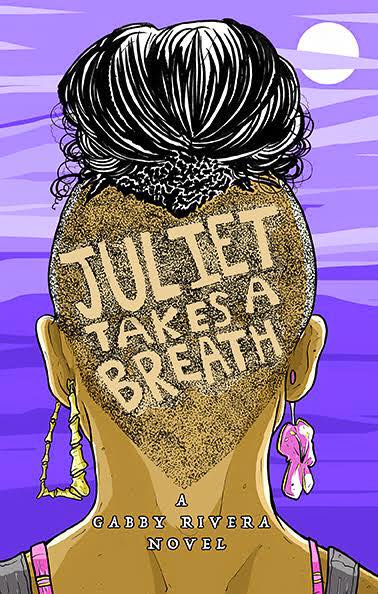Top 10 Queer and Feminist Books of 2016
2016 has given us all a ton of new queer and/or feminist books to read! Here are some of the best.
The Top 10 Best Queer and Feminist Books of 2016
10. Tranny: Confessions of Punk Rock’s Most Infamous Anarchist Sellout by Laura Jane Grace
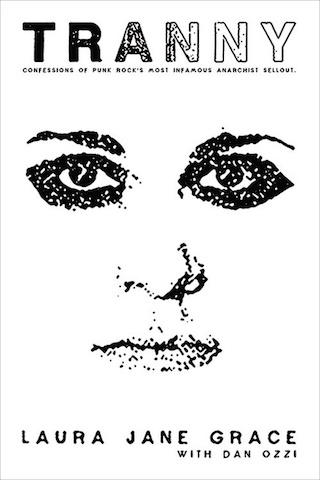
Punk band Against Me! founder Laura Jane Grace, with Dan Ozzi, tells the story of her life and career through memoir interspersed with years of old journal entries. The result, as an AV Club review notes, is “a bruising tale, but Grace writes about juggling the pressures of grappling with dysphoria and keeping her band together with such naked honesty that you can feel the weight being lifted off of her shoulders.” It’s also one of Billboard’s 100 greatest books about music of all time. In a review at the Guardian, Laura Snapes writes:
“It is, as its title indicates, an unsparingly honest read that hits as hard as one of Against Me!’s ferocious punk assaults.
‘A lot of the book deals heavily with shame, internalised transphobia and self-loathing, and I don’t identify with the title,’ [Grace] says wearily. ‘I don’t like that word [Tranny], so there’s a certain element of reclamation. And it goes along with ‘sellout’, like: go ahead, say the worst thing you can say about me, because I’m already saying that about myself.’ […] Tranny isn’t the soft story of ‘becoming Laura’ that some publishers wanted her to write, but an autobiography that reflects its confrontational title on every page.”
9. Shrill: Notes from a Loud Woman by Lindy West
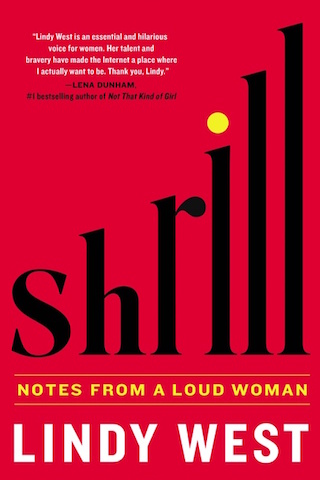
In this sharp series of collected essays, Lindy West discusses trolls, fat shaming, abortion stigma, misogyny, rape jokes and more with her signature voice. The resulting memoir, as Nora Caplan-Bricker notes, is “an in medias res snapshot of both contemporary feminism and of one of its loudest voices, a woman reaping the rewards and weathering the consequences of speaking her mind.” In a review at the Guardian, Annalisa Quinn writes:
“Shrill mixes humour with pathos so effectively that those qualities magnify each other rather than cancelling each other out. West has somehow stayed open and vulnerable in the face of constant attack, abuse that would turn a lot of people into a brittle shell, instead of a warm, capacious and funny writer.”
8. even this page is white by Vivek Shraya
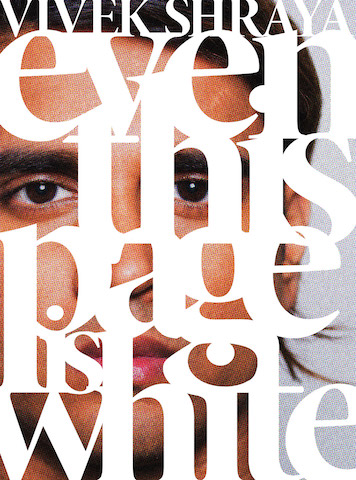
This debut poetry collection from Toronto-based trans artist and activist Vivek Shraya beautifully illuminates everyday racism across a multitude of spaces, and explores color and identity.
Shani Mootoo, author of Moving Forward Sideways Like A Crab, notes:
“This brave and very contemporary lyrical collection dares to ask the unspoken yet screaming questions, to finish the sentence that hurts, that reveals, that provokes, that celebrates. Like a Durga goddess, Shraya juggles with deft hands the multiple aspects of desire, race, gender, queerness and contemporary pop culture.”
(Read Shraya’s interview with Autostraddle on the release of her song “Girl It’s Your Time.”)
7. Problems by Jade Sharma
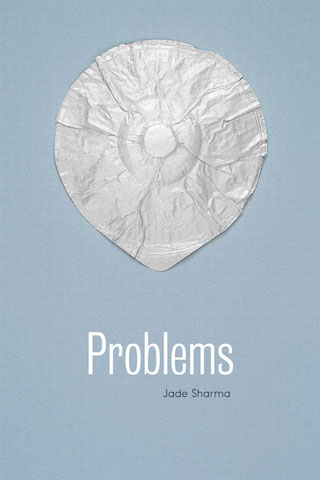
Maya has a heroin addiction, eating disorder, dying marriage, ending affair and growing inability to manage them all. Problems, told in fragments of Maya’s thoughts, avoids the clichés of addition and recovery narratives to speak to something dark, hilarious and deeply real. This debut novel is the first book in Emily Books’s imprint with Coffee House Press, and is long-listed for the 2017 PEN Open Book Award for an exceptional book-length work by an author of color. In a review at the New York Times, Lauren Holmes writes:
“The book’s vulgarity is deeply and powerfully feminist. Most of Sharma’s best lines are too profane to print; Maya’s narration is crude, unsettling and often shamelessly sexy […] She occasionally makes degrading remarks about other women that a ‘good feminist’ shouldn’t make, but even this behavior seems like a feminist response to the patriarchal commandment that women must always be polite. Maya is not polite, and although I found her captivating and charming, Sharma’s goal is not to make her likable. Maya is as horrible, and as fully human, as men in literature have always been allowed to be.”
6. Girl Mans Up by M-E Girard
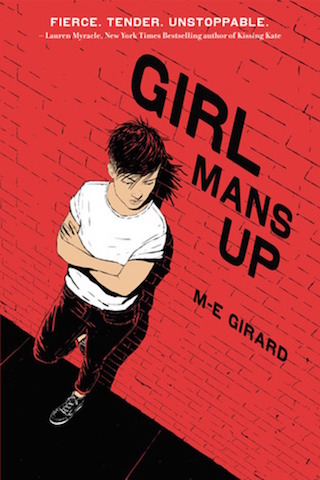
Queer YA needs more butch girls, and Girl Mans Up provides. Pen Oliveria, a 16-year-old Portuguese Canadian, is into video games and button-ups. As she navigates relationships with her conservative family, bullying childhood friend, and hot new crush, she questions toxic masculinity and explores ideas of respect and what it means to have it for herself.
In a review at Autostraddle, Emma Eisenberg notes:
“Girard’s writing is special in the way it speaks the language of our lived experience of moving through and within gender — inching, painfully slow, changeable, delightful, sexy, and made manifest in a thousand tiny ways, often between people and between words, unspoken. The writing also manages to hold at the same time powerful contradictions about the way spiritual gender feelings feel inside our bodies versus the way our bodies and selves are perceived and categorized by others. […]
But more than anything, this novel is a story of a person moving through the world, navigating the painful and joyful and difficult choices of constructing a self with integrity.”
5. Juliet Takes a Breath by Gabby Rivera
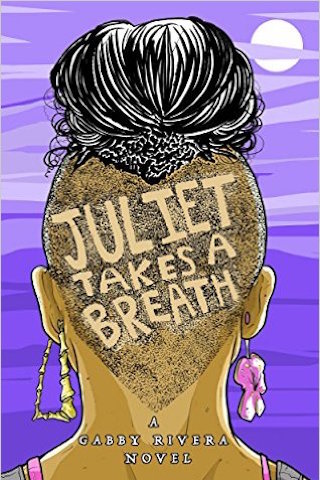
Juliet Milagros Palante, a Puerto Rican lesbian from the Bronx, heads to Portland to intern with her favorite white feminist author and find herself in this stunning debut coming-of-age novel by Gabby Rivera. On the way, she learns about radical feminism, bodies, relationships and love. In a tweet, Roxane Gay noted: “I strongly encourage you to read Juliet Takes a Breath. It’s quite dazzling, funny as hell, poignant, all the things.”
In an interview at Latina, Rivera says:
“There’s so much trauma associated with being lesbian, queer or identifying in a non-traditional sort of a way. As a writer, I’m over it. I didn’t want to tell that story at all. I wanted to look at queer relationships and show multiple models of the possibility of love: the first time you fall in love, how adults dismantle hetero love and create a love that’s theirs, polyamorous love. So, yeah, love was definitely important. It’s like a radical act, especially for a Latinx family. We are only viewed as warmhearted when we are caretakers. When it’s our own children, we are depicted as slapping them in the street. Our romantic love is sexualized. It’s not love, but sex. I just wanted to break that all away.”
Rivera is also writing America Chavez for Marvel (and previously wrote for Autostraddle).
4. Float by Anne Carson
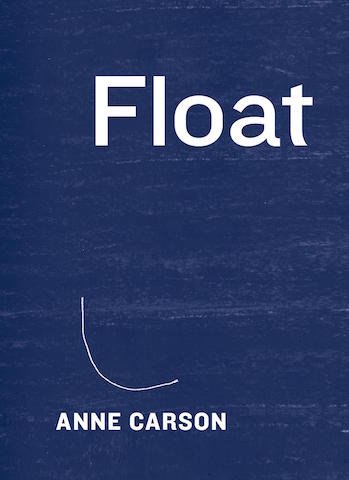
“I love Anne Carson’s work dearly though I suspect I am too stupid for it,” writes Charlotte Shane in a review of Carson’s Float at the New Republic. Float is a grouping of twenty-two small chapbooks, which float in a clear plastic box to be rearranged and read in any order and contain poems, essays, lists, performance art and thoughts in other forms that gesture toward myth, memory and language while retaining fragmentation challenging form. Shane continues:
“[T]he sensibility of (good) poetry permeates her texts—the language is eclectic, unexpected and exact; the voice singular, idiosyncratic—and she rejects any distinction between forms, explicitly and in practice. ‘Don’t like boundary’ reads one line of “Maintenance,” a piece mainly comprised of instructions for setting up an art installation. Float, as the name suggests, resists calcification on both a micro and macro level. It wants to remain in flux, perhaps because its concepts are too fine to merit certainty’s stillness.”
3. Swing Time by Zadie Smith
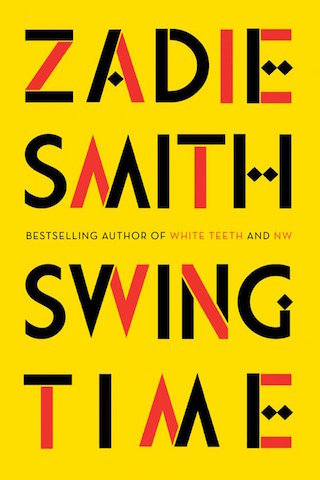
Zadie Smith, author of On Beauty and White Teeth, is back with this striking novel on women’s friendship, race, class, tap dancing, black bodies and black music, contemporary celebrity and more.
In a review at the Atlantic, Dayna Tortorici writes:
“Smith manages agile shifts in time, swinging between the near and distant past as the narrator probes her memory. Smith’s persistent withholding keeps the pages turning, and the I lends a new ease to her prose. But in describing her relationships with the women in her life, and with the men who come between them, the narrator reveals less about her character than about the contours of her mind. Interpersonal tensions give rise to smart observations — about identity, dance, women’s work, and cultural appropriation, and about two themes that have long been central to Smith’s work: blackness, and the fantasy of pure and discernible roots.”
2. Difficult Women by Roxane Gay
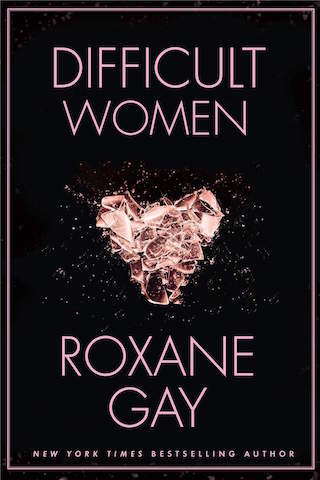
This beautiful collection of short stories from Roxane Gay, author of Bad Feminist and An Untamed State, which technically comes out January 3 but was also at my bookstore two weeks ago so I’m counting it, depicts a series of vignettes featuring women who in some way challenge patriarchal norms within their lives. A review at Publisher’s Weekly calls it “a powerful collection of short stories about difficult, troubled, headstrong, and unconventional women,” and notes, “Whether focusing on assault survivors, single mothers, or women who drown their guilt in wine and bad boyfriends, Gay’s fantastic collection is challenging, quirky, and memorable.”
You can read “In The Event of My Father’s Death,” one of the stories from the collection, at Vice.
1. Here Comes The Sun: A Novel by Nicole Dennis-Benn

Nicole Dennis-Benn’s debut novel depicts a fictional Jamaican resort town and Margot, a resort worker and sex worker trying to give her younger sister a chance to go to art school. When yet another resort developer threatens her town, Margot sees the hope of financial independence and the chance to reveal her homophobia-quashed love. In a review at NPR, Michael Schaub writes:
“Dennis-Benn’s writing is so assured, so gorgeous, that it’s hard to believe Here Comes the Sun is a debut novel. There are no wasted words; every sentence is constructed with care and a clear eye. She writes with a calm, steady voice even in scenes where things go horribly wrong for her characters. […]
[T]here’s nothing easy about this novel — it’s a joy to read, but you can tell that every sentence was hard-fought. Here Comes the Sun is tough, beautiful and necessary, and it feels like a miracle.”
What was your favourite book that came out in 2016? Yell about it in the comments!
9 Lesbian Romance Audiobooks To Warm Your Heart On Chilly Nights
Welcome to the fourth installment of Ask Your Friendly Neighbourhood Lesbrarian! Don’t forget to keep your emails and tweets coming to stepaniukcasey [at] gmail [dot] com or @canlesbrarian asking for help finding your next favourite LGBTQ2IA+ books! No question is too weird or too big or too specific.
A little while back I had this fun exchange with a queer reader on Twitter, who asked: “Can anyone recommend some #lesbianromances with audiobooks? I can’t find any.”
I replied: “Do you mean books that are classified in the genre romance (like from Bella Books, etc.) or just books with a romance element?”
She answered: “I’d prefer books defined as romance but I would accept ones with just romantic elements!”
This question and ones like it, asked into the abyss of the twitterverse, are basically my reason for living. Honestly, answering these kinds of questions is the only thing I do in my life that makes me feel like a superhero(ine). Lesbrarian to the request! This woman’s question is also great, since I haven’t talked about audiobooks at all in the column yet, but I love them. Whether you listen to audiobooks while commuting or because you have a print disability or just for a change of reading pace, audiobooks are so awesome!
So, there are two major publishing players in lesbian romance: Bold Stroke Books and Bella Books, and both of them publish audiobook versions of their lesbian romance titles. Audible.com (the Amazon for audiobooks), in fact, lists 48 by Bold Stroke Books! There are sadly fewer by Bella Books. Bywater Books, LadyLit Publishing, and Yvla also have a few books in audio format. If you have a favourite romance writer who publishes with any of those publishers, though, chances are there are some audio versions of her books. Do a search on Audible and/or your local library’s website! (Did you know you can get digital audiobooks from your local public library? You’re welcome!)
My pro lesbrarian tip for finding good audiobooks is to pay attention to who reads the audiobooks you’ve loved. Many of the audiobook platforms let you search by reader/narrator, so then you can see everything they’ve done. Obviously, you can assume that if they’ve done a good job on one audiobook, their others will be great too. I’ve also found the many readers tend to work within certain genres or types of books. One of my favourite readers is Robin Miles, who usually reads books by Black women authors.
This is by no means a comprehensive list that I’ve made. Some of your favourite lesbian romance writers may not be on here, and that’s because there are just too many to fit. Some of these are traditional happily-ever-after romances and some are other stories with or without HEAs that have a good dose of romance in them. Above all, these are all quality audiobooks productions.
Snow Falls by Gerri Hill

Snow Falls is a classic romance trope done very well: that old strangers-get-stuck-together-somewhere-and-fall-in-love schtick. This unlikely but highly entertaining scenario happens when Jen, an author on her way to a writer’s workshop, get lost and stranded in the Colorado mountains after an avalanche. She is luckily rescued by recluse Catherine Ryan-Barrett, who goes by Ryan. Stuck together in Ryan’s cabin until the spring thaw, their friendship and then more-than-friendship develops slowly. I really like the reader Sara Hawthorne, who has a kind of husky, soothing voice with maybe a subdued Southern accent (I’m Canadian so I dunno). If you like Gerri Hill, lots of her other romances have been translated to audiobook format as well.
My Education by Susan Choi
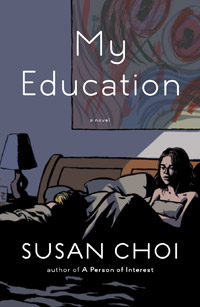
My Education is an exquisite book that has a great audiobook version read by Tavia Gilbert, who imbues bisexual grad student Regina with all her contradictory naivety, passion, intelligence, and emotional immaturity. Her all-consuming affair with her professor’s wife Martha, described in Choi’s juicy Victorian-esque writing, roars to life. Although the romantic and sexual relationship between Regina and Martha is definitely the meat of this book, it’s not a romance in the traditional sense; in other words, no HEA. But My Education is a beautiful, whirlwind tour of the throes of first love that you think is never going to end (of course, it does). It is gorgeous in audio.
Waiting in the Wings by Melissa Brayden

Waiting in the Wings is a fabulous femme-femme romance superbly read by Betsy Zajko. The two leads — both in the novel and the Broadway touring production it centres on — are Jenna and Adrienne. Jenna is a gung-ho young actress who’s spent her life training to be a musical theatre star; Adrienne is a TV star pushed into the business by her mother. Of course, they fall in love; but can two women dedicated to demanding, competitive careers make their relationship work? Zajko does great voices, including men, like Jenna’s gruff New York agent, and excels at differentiating between the narration and the main character speaking. Brayden’s How Sweet It Is and Kiss the Girl are also available on audio, but I personally don’t like that reader as much.
Lucky Loser by Yolanda Wallace
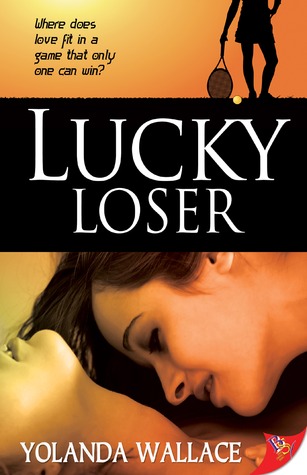
Lucky Loser is a fun tale of sporty dykes falling in love. Definitely listen to this if a romance that takes tennis as seriously as it does lesbian relationships sounds up your alley. The main character is Brit Sinjin Smythe, who is trying to resurrect her tennis career after a knee injury. Her former doubles partner and the only tennis friend who visited her while she was recuperating is Laure Fortescue. Both women wind up at Wimbledon, Sinjin having clawed her way there, and they begin to wonder if their friendship might be the way to a real lasting relationship. But can their burgeoning romance survive the championship game? This is admirably narrated by Lori Prince, except that her British accent leaves a bit to be desired.
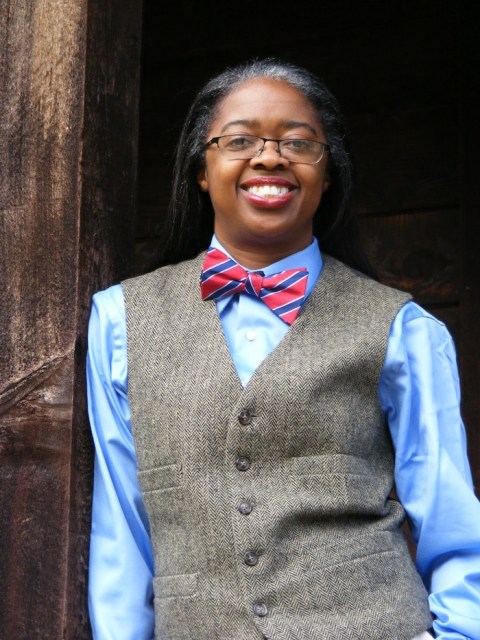
(This is completely irrelevant, but I have to share Yolanada Wallace’s author photo, because it’s quite possibly the most adorable author photo I’ve ever seen in my entire life. The bow tie! The glasses! The smile! Swoon.)
Patience and Sarah by Isabel Miller
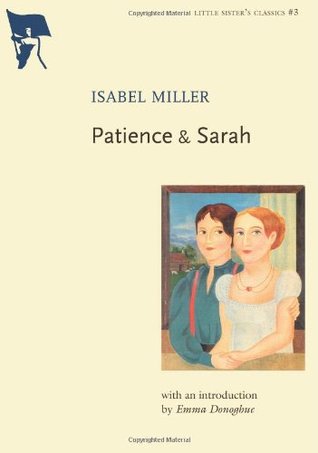
Patience and Sarah is a classic lesbian novel originally published in 1969 given the royal audiobook treatment in a reading by Grammy Award-winning narrator Janis Ian and Emmy and Tony Award-winning actress Jean Smart. Ian and Smart each perform one of the characters, as this love story between two women in 19th century upstate New York alternates between their perspectives. Patience, narrated by Smart, is a painter, and Sarah, narrated by Ian, is a farmer. It’s a love that knows no bounds — of gender or class — and conquers all kind of story, intimately and joyfully read by two talented actresses. Ian excels at Sarah’s rough, rural, grown-up-around-men voice and Smart at Patience as the sweet yet slightly naughty educated single young woman.
I Can’t Think Straight by Shamim Sarif
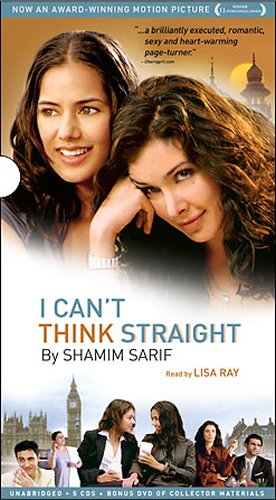
I Can’t Think Straight might be more familiar to you as a movie, but it was first a book, and it has recently been translated to audiobook. Again, if you’ve seen the movie, the name Lisa Ray probably sounds familiar: yes, the actress with the sultry voice who played Tala in the film also reads the audiobook. In many ways, this is a classic opposites-attract story between outgoing, boisterous Tala and Leyla, the shy woman dating Tala’s best friend. It’s also a love story in the context of cultural and religious differences: while they both live in London, Tala is Palestinian and Christian, whereas Leyla is Indian and Muslim. It’s also pretty cute and funny. If you like Shamim Sarif, her other lesbian romance, The World Unseen, is also available in audiobook, also narrated by Lisa Ray.
Tipping the Velvet by Sarah Waters
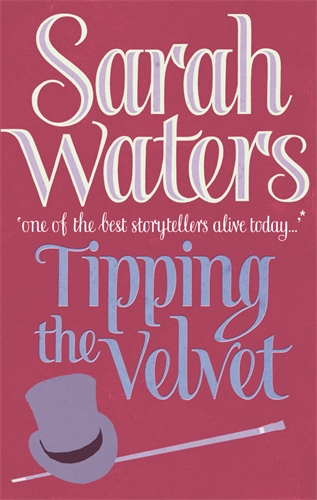
Tipping the Velvet is a now-classic lesbian romp set in the Victorian period about Nan King finding her (lesbian) self. It makes a thrilling audiobook, especially if you’re North American and you can’t hear the English accents in your head. Narrator Juanita McMahon gives it her all, bringing to life all manner of classes and genders as Nan goes about her delightfully tumultuous and melodramatic journey of touring as a drag king, having lesbian affairs, being a kept woman by an evil yet sexy older woman, doing gay sex work in disguise as a man, and finally self-identified activist and “tom” with a real grown-up lesbian relationship. The detailed sexy times are balanced by the fun historical details and intricate and at times hilarious plot.
Huntress by Malinda Lo

Huntress is a lush lesbian YA fantasy that I mentioned in my last column and I was happy to find out that it exists in audiobook format. Lo herself narrates it, and at times I wished she would put some more oomph into her reading. But she isn’t an actress after all, and I’ve heard other books read by non-actor authors that were much worse. While this is an epic fantasy, it’s also a pretty epic love story between Kaede and Taisin, two young women who are kind of opposites — one an earthy hunter and the other a powerful wielder of magic — but also destined to be together. Warning, this is a very cute love story but it (realistically and satisfactorily, in my opinion) does not end in an HEA.
Rescued Heart by Georgia Beers
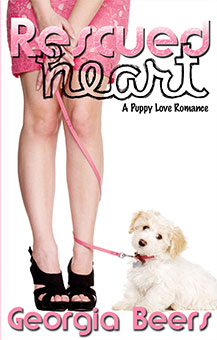
Rescued Heart is the first in the adorable albeit cheesy “Puppy Love” series by this renowned lesbian romance writer. It’s read by Abby Craden, who in my subjective opinion has a really sexy voice; from a more objective viewpoint, she does a great job at both women’s and men’s voices. Rescued Heart is set at Junebug Farms, an animal shelter where Lisa “keeps-her-emotions-in-check” Drakemore is in charge of intake and adoption. Her dog-walker love interest is Ashley Stiles, who is described as “a distractingly attractive, perpetually late, emotions-on-her-sleeve young woman who smells like cupcakes.” Sounds like my next girlfriend. Lots of Georgia Beers’s books are available in audio, others read by Abby Craden, some by the author.
Bonus: Did you know that Landing by Emma Donoghue, which I mentioned in my first post and think is the perfect romantic comedy in book form, is available as an audiobook? Also, apparently there is an audio version of Autostraddle favourite Juliet Takes a Breath by Gabby Rivera, which is exciting except I am a bit skeptical since the reader does not appear to be Latinx. Anyone listened to it?
Check out the Lesbian Romantic site for more lesbian romance audiobook reviews and let me know in the comments if you have other recommendations! Also, lesbian powers that be, please bless the world with more lesbian romance audiobooks by women of colour, the situation is dire.
Gabby Rivera Will Write “America,” Marvel’s New Queer Latina Comic Book, And We’re Flipping Out
The world is dark and light is precious and here’s a display of fireworks: Gabby Rivera is writing America Chavez’s new solo comic book! Marvel announced their plans to give our favorite queer Latina teen her own title just last month at New York Comic Con, but we had no idea they’d bring on a queer Latina to write her; much less one of our all-time favorite queer Latina writers. (And Sara Ramirez’s too, while we’re on the subject.) Gabby, as you know, is the author of Juliet Takes a Breath and a longtime contributor to Autostraddle and the former head of our QTPOC Speakeasy. She’s now the Youth Program Manager at GLSEN.

Variant Cover of America #1. Art by Marguerite Sauvage.
Refinery29 posted the America Chavez creative team announcement today, along with an interview with Gabby and a first look at the art for the new book. We also got a little information about which Marvel universe America will be inhabiting; she’s been in practically all of them! And we got a little information about how our Trans Editor and Drawn to Comics expert Mey Rude consulted with Gabby on the book. (I buried that lede because I wanted to stretch out the excitement.)
From Refinery29:
What were some of the things that excited fans about America?
Gabby Rivera: “One is, the identities: Queer Latina. She’s also a positive presence and has these catch phrases, like ‘chico.’ And she has feelings for Kate [Bishop, a.k.a. Hawkeye]. But there are more questions about what her powers are, who she is and what is she interested in. My friend Mey was like Gabby, ‘Don’t try to write a superhero comic book. That’s not why they reached out to you. Put all the joy and excitement and energy and quirkiness that you did with Juliet and bring it to America.’ So what song does she listen to when she wakes up in the morning? Does she brush her teeth in her underwear? What type of girl is she? The fundamental questions you have about someone you want to be friends with.”
One of the most frustrating things about women on superhero teams — in both comic books and movies — is that their actions are almost always overshadowed by the men on the team and their motivations are rarely explored. Think about Avengers: Age of Ultron. Black Widow, as written by the guy who gave us Buffy, was reduced to a woman who couldn’t have children. That’s was it. That was her main thing. The huge backstory reveal feminist fans had been promised for years after watching women in Marvel’s cinematic universe get ignored and tossed aside was that Natasha Romanov’s major life milestone was a decision to become an assassin instead of a mother. It was the one thing that defined her entire personality.
Well, not in this new Marvel book! Gabby says she’s excited to explore America’s agency and her story outside the teams she’s been a part of: “So my thinking for this new book is that she’s finally asking herself that question: What’s in it for me? Why am I fighting with these people? What I want is to go to college and I want to start over, and I want to learn about myself and do this for myself.”
I can’t wait to watch her answer all those questions.
America Issue #1 will arrive in March 2017. I’ll bet Mey and Gabby will have a conversation about it on this very website as the drop date gets closer!
You Should Go: Gabby Rivera’s “Juliet Takes a Breath” Book Release Party!
Over the last few weeks, we’ve been talking pretty much nonstop about Gabby Rivera‘s debut novel, Juliet Takes a Breath. If you’ve read it, you know why: It’s a queer coming of age story about a Latina teen named Juliet Palante, and it’s raw and real and hilarious and unlike anything you’ve ever read. (If you haven’t read it, you should fix that right now!) Either way, you’re invited to the book release party at Bluestockings bookstore in New York City this Saturday (March 26th) at 7pm!
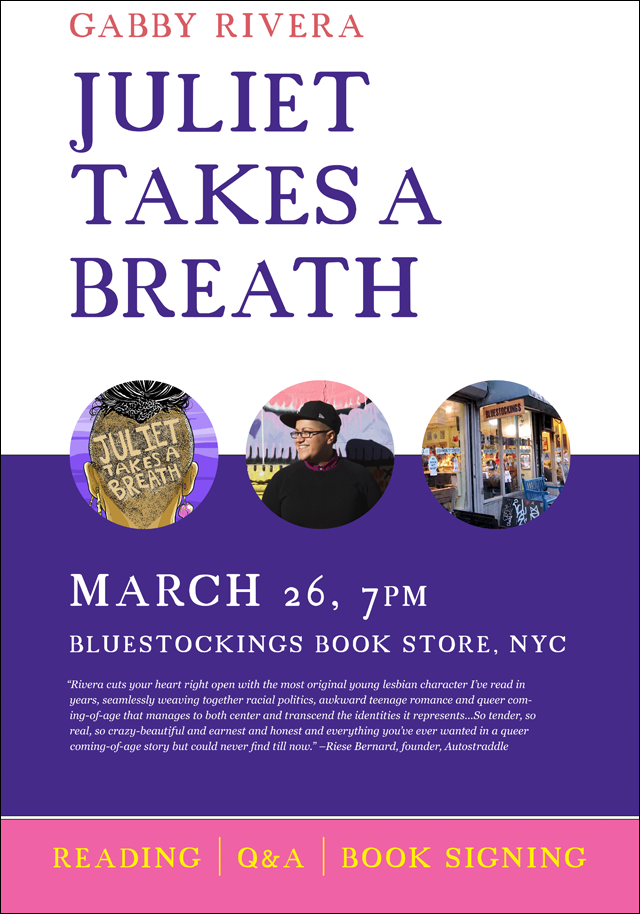
Juliet Takes a Breath has universally positive reviews on GoodReads and Amazon, and the love continues to pour in for it as book clubs around the country pick it up and find themselves enchanted. Look, even Roxane Gay is smitten with Gabby’s writing.
https://twitter.com/rgay/status/694987948861874176
At the party, Gabby will show a short film about her life and do a reading from Juliet Takes a Breath. We’ll have an audience participation Q&A. And Gabby will be available to sign your book. (Bluestockings will have copies on hand for you to buy, if you don’t have one already.) Plus, plenty of our other Autostraddle staff will be around for you to chat with you while you wait to get Gabby’s autograph.
Bluestockings is located at 172 Allen Street, New York, NY 10002.
For more information, check out the official event page on Facebook; leave a comment here on this post; or shoot me an email. We look forward to seeing you on Saturday night!
Read A F*cking Book Club: A Conversation With Gabby Rivera About “Juliet Takes A Breath”
Welcome back to Autostraddle’s Book Club! Let’s talk about Juliet Takes a Breath by Gabby Rivera.
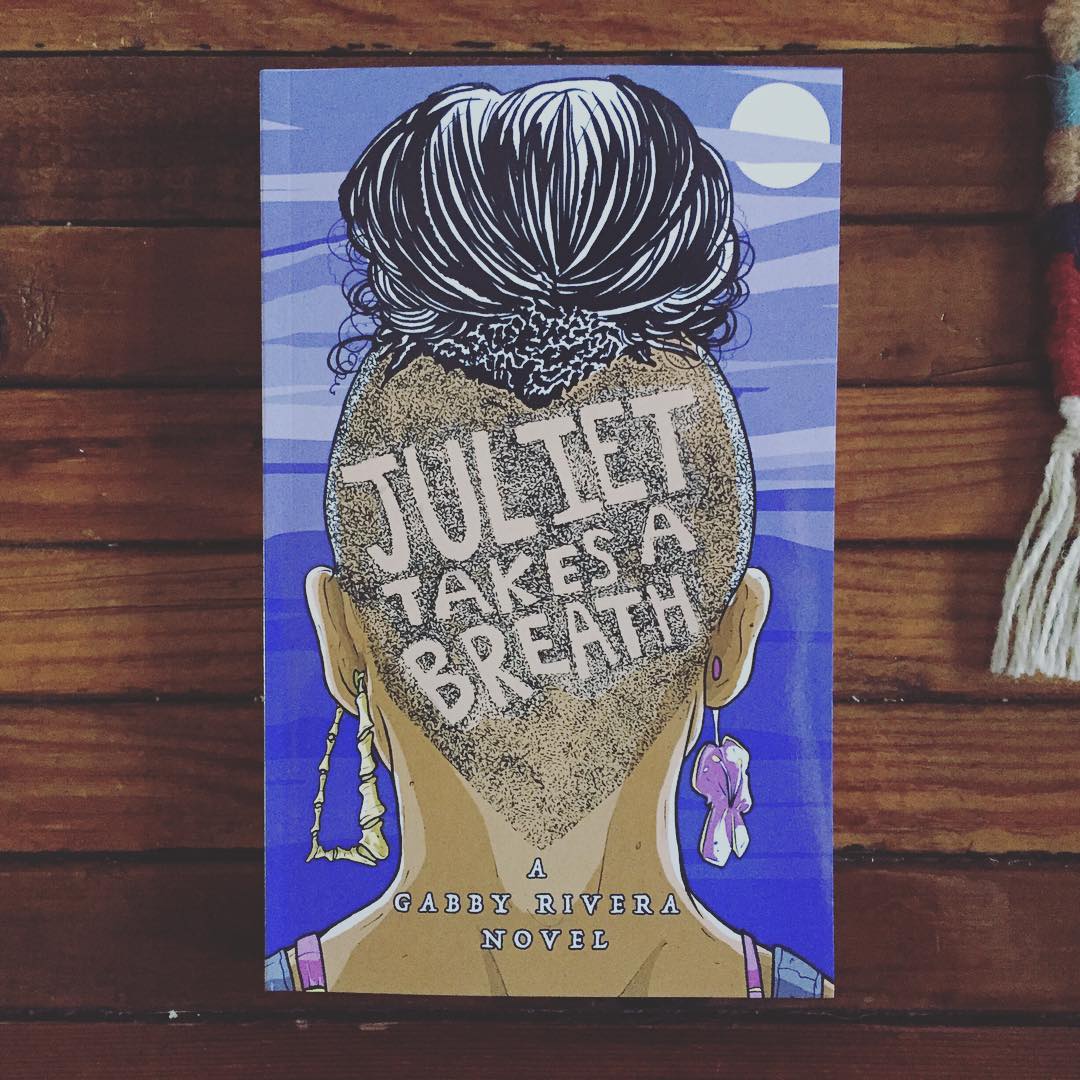
Since I last announced we were going to have an Autostraddle book club on Juliet Takes A Breath, so many things have happened! You ordered the book, it arrived, you dove right into the book and didn’t come up for a breath till you finished, Roxane Gay read it too and gave it raving reviews on Goodreads and on Twitter and now we’re all here to revel in all it’s glory together!
I interviewed Gabby — well it was more of a conversation with Gabby, a really good conversation with Gabby about her book. We talked about subtleties in Latinx media representation, queer community, forgiveness and, of course, Lil’ Melvin.
Yvonne: It’s been a couple weeks since your book has been officially out. How do you feel about the world getting your book?
Gabby: I am so pleased that Juliet is being received with lots of love and excitement from other people, especially other queer people and queer women and women of color, my community of people. I feel really humbled and excited about all of that for the book. I feel really excited for Juliet, she gets to go out into the world. She’s not just this character/book situation that I am grappling with alone at home. So I feel really excited. Muy excited.
Yvonne: That’s good, I’m glad. I feel like everyone should be excited because it is such a good book and I’m not just saying that. I really do think it’s really awesome.
Gabby: That means a lot coming from you. I have so much love for my queer community. It’s full of really smart and honest radical folks. One of the things I was worried about was will my family, my queer chosen family, appreciate this and love this because I know that they wouldn’t bullshit me.
Yvonne: Yeah, I feel that.
You’re writing an essay for Autostraddle about how Juliet Takes a Breath came to be. Can you give us a little sneak peak of what that essay will be about? What inspired you to write this book? Why did you want to take it into the YA novel direction?
Gabby: One, it started off as a short story. Anyone who has bought, purchased or read Portland Queer: Tales From the Rose City edited by Ariel Gore knows that. You’ll find the first iteration of Juliet Takes a Breath in that book. I never meant it to be a long novel. I just wrote this short story. During a reading for Portland Queer — it was nominated for a Lambda so the Lambda Awards had a reading for the nominees — somebody who was in the audience was like, ‘I really like the way you told that story and I really liked this story, if you turn it into a book I will publish you.’ I was like Whhhaaat!
Someone was just like, I will publish you. What? That wasn’t even my world at the time. I was still freelancing in TV/Film, I was on the hunt for something to crack. I took a year off on unemployment. I just want to say, in case the government is reading this, that I definitely tried, every week, my best to find legitimate employment while I was home working on my book. That is kind of the long and short of that, with more details to come.
And the YA direction, well technically it’s something called New Adult. It’s New Adult because Juliet is a little older. She’s above the age of consent and is involved in stuff that goes a little beyond high school experiences. That was just how it was. I was writing from a first person perspective which was the attitude and tone which naturally fell into that genre. I think I kind of write in that way in general. Very first person, in your face, this is what I’m going through here are my jokes. This is how I see the world kind of thing.
Yvonne: One thing that I love about your book is that it doesn’t follow the formula of other queer New Adult narratives. It’s not centered on a love story. There are a lot of different threads throughout your book that it is not like oh, the protagonist meets a girl, she falls in love and now she has to come out to her family and that is the whole plot. It’s centered on finding new things about herself. Why is that narrative important in telling other LGBT stories? I know you were centering these things on your own experiences, maybe you can talk about that?
Gabby: One, yeah, it’s based off of something I actually experienced. When I was first writing it, I wanted the book to be as true to form as I could remember it. We’re talking about before workshops, before anyone was reading it, before people were guiding me, it was just me in my brain thinking ‘oh this is how you write a book, you have to write down every single thing that ever happened to you.’ For me the story was always about that moment you fall in love with a book. There are only some moments with girls that have felt even a little bit like what it’s like to experience revelation that comes from a book. That was always the central focus. This is the story of about someone who goes on a journey because of these new experiences and new ideas. Also, ideas that feel really familiar because I think Juliet is grappling with feminism in that way. Here is a white lady author who has all this sparkly new language for some stuff that she is already seeing in her mom and grandma and in her own life. I also I wanted her to have fun. Sometimes I think when someone is stuck on one person and they’re only dealing with the ups and downs in that relationship it can feel real heavy. I didn’t want to do that. I wanted Juliet to be able to make-out with other people and not have audiences be like, “she’s cheating, oh my god.” I wanted there to be some wiggle room. Also, you and I know this — you never hear about Latinas reading anything! I’ve never read a novel about a Latina queer person and their nerdiness.
Yvonne: I found myself laughing out loud to so many things you wrote and really connecting with Juliet and random Latino things. Not just with the Virgen or Selena references but also — the one that stuck out the most to me was when she was on the bus in Portland and everyone was smelly, that legit happened to me in Austin too. I thought why the fuck are all these white people on this bus and why do they stink? That whole section about your mom telling you how to clean yourself, I thought this is a Latino experience, this is exactly what my mom told me too. I really appreciated that your book incorporated things like that — that weren’t just outright oh this is a Latino thing like saying a Spanish word or sharing Puerto Rican food or something that is super identifiable. It was more like seeing my own experiences and knowing how that feels. This isn’t really a question. I wanted to appreciate that. Maybe you wanted to talk about that.
Gabby: It’s hard to be seen sometimes. I think sometimes the only way that mainstream entities think that certain identities can be made visible is by music or food. If it’s McDonald’s and it’s the Latino McDonald’s commercial it starts — ting ting ting, salsa music starts to play and it’s someone with a Spanish accent talking about McDonald’s.
Or like on The L Word for Carmen, I loved that representation but it was very much, ‘let’s make sure there’s a quince in there.’ What I’m trying to say is that there isn’t a lot of subtlety in portrayals of Latinos or ethnic group or whatever group of marginalized people. It’s really cool to hear you say that you identify with those things. Because of that lack of representation, then you aren’t sure if other Latinas are experiencing the same things you are. There isn’t enough media for us to see those other smaller ways that we experience similar things. It was also important to just be honest. You know, I have this same experience, I got on a bus in Portland and was like what the fuck? The Bronx has its own smell, urban environments have their own smell and I think you get kind of used to that. I think that there is also ingrained internalized white supremacy at play because you imagine that white people are not going to smell or not be gross, or be poor. Those moments, I didn’t want to water them down. I didn’t want to portray Juliet in that way. She isn’t perfect. She is going to be wide-eyed and awkward with things. She is going to be like ‘damn, this fucking stinks.’
Yvonne: Were you ever like “I’m a Latina and this book is going to be about queer people of color so I have to actually bring it.” You know what I mean? Did you ever have a fear of not owning up to that?
Gabby: Yo, girl let me tell you, the first iteration of this book happened before I was really deep in my evolution and deep in my political consciousness or my radical self. It would’ve been the novel that fucking bombed in my face if I hadn’t taken time to explore things with Autostraddle — explore writing about different stuff for Autostraddle, reading Autostraddle, being, unfortunately, called out by people in the comments section for all sorts of things. It may have been hurtful or made me feel ashamed but it helped me grow. Also, the internal community of Autostraddle always being there. ‘Hey, you got called out, let’s talk about it, all of us will talk about this with you together, we are going to get through this and learn what it means to be seeped in white supremacy and learned what it means to be transphobic and we’re going to have this safe space to learn about all this stuff.’ That support was always there.
The book is at least five years in the making. When I hit a certain point, I thought ‘this can not work.’ Something in my head thought, wait, my people are missing from this. My radical consciousness is missing from this. I didn’t know who Juliet was. It was just this story that had no context. I didn’t feel pressure to hit every point to make sure she didn’t do this, and make sure she doesn’t say that. But I owed Juliet depth and I owed her an evolution. I owed the people in my life representation. For example, Maxine is based on a mentor of mine who is a Black womanist theologian and when I was writing Maxine first I didn’t have that person in mind. Maxine was flat and was maybe stereotypical in different ways. When I started sitting in myself and thinking, who do I love, who are my people, how can I pull their voices into this? It really raised the novel up and elevated the writing and Juliet’s experience. It really raised it to a place where I was like, “Oh I feel proud of this.”
Y: The biggest revelations or takeaways that I got from the book happened at the end of the book when Harlowe does some fucked up shit to Juliet and then Zaira basically teaches Juliet about how not everyone is disposable and about forgiveness. There’s this really awesome line that I really love, I’m just going to read it to you: “You’ll learn when to forgive human error and when to eradicate the unworthy from your spirit.”
It’s something I’ve been grappling with a lot, like when somebody in your community fucks up, how do you deal with that? We live in a hardcore call out culture and we’re just so used to just telling people, “You fucked up, get out.” It just made me pause and think, like, “are they really disposable? Are these queer people, who are supposed to be your community, disposable?” Even if they’re white. As a person of color, white people can do fucked up shit but do we really need to shut them out? It was just something that hit me for some reason. So was that an intentional thing to incorporate or was that something that you learned, you’ve been learning, how did you come to put that in the book?
G: I really wanted to explore relationships and the way that they’re complicated. I’ve had the lovely experience to exist in many different types of queer, lesbian, dyke circles and age ranges. I noticed how deep and strong their bonds were with each other were, but also how deep a cut off could be. And so it wasn’t like their first response is to cut people off. I’ve seen a lot of older women be in these really impenetrable, unbreakable, totally solid relationships, platonic or otherwise, and that isn’t something we always get to see. Because one of the lesbians dies or something comes along and seems unforgiveable, you know for the dramatics of the story, people break up and that’s it.
And so, with their friendship, i wanted to explore that. In my heart Zaira is Afro-Latina, but also Black American so she’s both of those worlds and Maxine’s Black American and then you have a couple of other characters, another Latinx character and a white character, so it was all these women with all these different ethnicities and some white people. I took the pressure out dealing with whiteness in this particular context because I’m dealing with it so much in other ways, like how would they navigate this friendship? Would changes in their intimate relationship really be the thing that totally cuts them off from each other? And also is that what I want to say to my people and to the younger queers out there in the world? Like, oh yea, well, since this happened and she did this and they did that, now no one is speaking to each other and that’s fine and forget them. I don’t think that’s the answer. When you can move forward and you look back on your relationship with a person and it has withstood all of these things, I think in front of you is someone who you can say will always be there. And we need to model loving behaviors. No one is doing that for us. Where can we see that? Where in our actual lives and in media representation do we really see queer women, queer adults, continuing and holding onto these friendships and these relationships in a way that doesn’t diminish their spirits, but that make us all stronger. A lot of it is intentional, but there was definitely a moment in those scenes where I was like, “Ok. What do I want to say, what would be authentic to them? What do I want to leave them with?”
Y: I know you as a person are just very good at like being… I don’t know. You look at all the good in people. You’re very good at that. And I feel like that portion in the book was a representation of that. You see the good in people and you take that with you.
G: It’s so hard! All of this shit is so hard, like, I think that we should move with love and especially gentleness. I think sometimes it’s hard to be gentle because we are violated, we are marginalized, we are pushed to our limits, we are not supported in so many ways, and that’s like a general we. We, people of color. We, queer people. We, poor people. We, all of these people, right? Why not try? And this is also in no way indicative of cosigning these bad people in your life, you know what I’m saying?
Y: Definitely, yea.
G: And that also is the tricky part because some people may look at Harlowe’s behavior and be like, I will not accept that, I will not tolerate that, I will not keep that, and so it’s not like an indictment against either, it’s more like this situation, this is what these people chose to do.
Y: Yeah, what I’m trying to say is that I think we’re so quick to cut people off, and I mean it’s true, sometimes some people do need that, like if someone really crosses a line with them, who aren’t their friends, you don’t need to give them the time of day, you don’t need that person. But I feel like this is something that a lot of people don’t give enough thought to.
G: Harlowe has already lost significant things at this moment. It’s almost like Maxine and Zaira are so with it that they know that she is suffering in different ways, you know what I’m saying? There is loss and sometimes it’s enough for a person to have lost romantic love. We do not have to then further isolate or excommunicate.
Y: I was super jealous of Juliet’s mentors, just like the plethora of people of color mentors that she had, because I wish I had one. You’ve worked with LGBT youth in the past, and you were just talking about a mentor that inspired Maxine, so like how did your experiences with mentorship in general influence that aspect of the book for you?
G: This whole thing wouldn’t have been possible without the mentorship of older women, women of color, queer women — like just hands down. So it was, for me, really important to write that. And also that was the world that I was inhabiting too, so when I’m bringing them together and fictionalizing them, I pulled from everybody.
I am a queer Latina. I am alive, thankfully. I have supportive family. I have a supportive queer community. Those are gifts, those are gifts from the universe. For me not to provide that for others, or do work in that area for queer youth, LGBT youth, to me that’s like a disservice. You have to share those gifts. So building in mentorship to the story about Juliet was kind of like marrying all of those things. So it’s like an homage. I’m choosing to honor the women that have influenced me. It’s modeling how you can relate to others, how to reach out to others, how others can interact with young people and also creating something that will live beyond me. And creating something that can be used in a lot of different ways. And young people who don’t feel like they have representation, here we go. I think that’s a form of mentorship too.
Y: Another thing I really liked about your book is all the family in your book—all the badass women in your book. My family is very matriarchal. My mom runs everything. And that’s something that I know isn’t usually the norm in Latino families. So it was really cool to see Latina family members running shit. The aunts that you wrote about and Juliet’s mom — I just felt that was really powerful in itself, even though Juliet’s mom had reservations about Juliet’s queerness in the beginning. It was just something that I was really happy to see, because people have this one view of what we say about being a queer Latinx.
G: My parents have like a 50/50 situation in the house, but my my grandmas ran their homes. My mom’s mom was definitely like the abuela who didn’t really speak a lot of english, but was like a boss, and had five kids, worked hard and was a seamstress in the Garment District and was newly transplanted from Puerto Rico into hostile white america in NYC. I didn’t get a lot of time with my mom’s mom because she passed away when I was ten, but she was definitely like the matriarch. And my dad’s mom was a powerhouse in her own right. She was a woman that learned English, was the cleaning woman at a school and then worked her way up to get a Bachelor’s in education and become the head teacher in that school. She owned her own businesses. She sold jewelry on the side. She was the epitome of a powerhouse of a woman, a hustler. She was like Blanche Devereaux too, in her glamour, in her method of dress, in that everything had to be professional and stylish—I’ve never seen a woman like her. Maybe my mom’s mom, in a more traditional sense, but I’ve never seen a woman like my grandma anywhere. And that was important to me. The machismo lives in other areas in the book. I think for me some of the most vibrant people on both sides of the family have been women — Titis, cousins — loud beautiful brassy bold women. There’s an idea of machismo, but sometimes it’s this laid-back thing where men sit in another room, watching the game and all the women are in the kitchen making the decisions and running shit. So that was just important to me, I love the memories of my family. Also, I’m not gonna name names, but a lot of the more famous and more well-known stories about Latinos are so male-dominated and it’s so exhausting to navigate.
Y: For sure. I agree. But, Lil’ Melvin was a highlight of the book too! I was like “oh my god, I love him so much! He’s so cute!”
G: I know, people are writing to me about how much they love Lil’ Melvin and he’s like, in eight pages!
Y: No, he’s like so good! He’s so good.
G: Okay, let me ask you, why do you love Lil’ Melvin?
Y: I think I love Lil’ Melvin because I also have a little brother too. I have images of childhood too, like with his round belly, being a weirdo and us being weirdos together. When I came out to my brother, he was just like “okay.” Because we were having a conversation about girlfriends, and I asked him, “do you have a girlfriend?” and he was like “No, I’m not seeing anybody, how about you?” And I just went for it, I was like “Yeah, I have a girlfriend,” and I was just talking to him about her. And I was just looking at him and he was like “What? Did you want me to judge you?” And so Melvin just reminded me of my own brother, how he’s just low-key super supportive.
G: I wanted him to not be a loser, to be a nerd and be hilarious and be supportive and be his own little rockstar. I feel we don’t get that either—I feel like Latino men and boys are treated in a certain way — they’re like gang bangers or drug dealers or assholes. Where there could be more nuance, there isn’t, and so Lil’ Melvin was just fun, and incorporated some elements of my brother when we were growing up. My brother and I would spend hours playing Final Fantasy. And by playing, I mean my brother would play, and I would sit there with the story and help him strategize.
Y: That’s hilarious. Just having him be gay or queer too is awesome too, it’s just like, “What! Lil Melvin! You’re so cute!”
G: If I remember correctly I don’t think Juliet’s father Ernesto has any actual lines in the book. I know this is silly, like “oh not all men are bad,” but I also wanted there to be a relatable or lovable character that identifies as male. I think that’s important too, if there is a queer Lil’ Melvin out there and he snatches his sister’s copy of Juliet Takes a Breath, I want that to be there too — some goodness, so that I don’t demonize my people too. I didn’t want the only reference of Latino boys in the book that even I wrote is a bunch of guys cornering this one girl in a bodega — that didn’t sit well with me either. It kind of goes back to your question — there were totally moments where I gotta hold myself accountable for so much in here so that I can serve my people as best as I can.
Y: Yeah, definitely. And it’s a tall order, you have to write to the queer aspect, and the Latina aspect, and your feminism and this and that…
G: And gender too! If I was further along too in my own personal evolution there may have been more there as far as gender essentialism and pulling those pieces apart too. I wanted Juliet to be authentic in the way some people experience evolution. For me, there was figuring out I liked girls, and then there was identifying as a lesbian, and then identifying as queer, and then altering my presentation to feel more comfortable, and then there was experiencing this and that, so it happens in pieces and stages for some people. Maybe someone experiences all of these things at the same time, but I wanted it to be there in the ether—like there is so much more for her to learn, for people to learn, and it doesn’t all have to happen at one time. And also, a part of that is that there’s still so much space for so many narratives.
Y: Yeah. And nobody, not one person, evolves that much in like, one year.
G: One summer!
Y: One summer, yeah! I totally understand where you’re coming from, and I think you did that—you made room for those other things to be told, in other stories.
So another big pillar in this book is the queer community of course, something that is also not talked about in YA/new adult books. It’s not talked about, as in when you’re newly queer, you think queer community is going to the gay bar, and you really don’t know what that looks like yet because you’re a new member of the club and you don’t know where to go. I feel like queer community is something we don’t talk a lot about but we really need in your life. I don’t know how to explain it…we all have to figure out how to find that, and there’s different ways you can find your queer community, but it just demonstrates how important it is to find your people, and to find a crew that you love and that loves you back, that reflects your whole self. I know Juliet was trying to figure it out in Portland, and then when she went to Miami she found a better queer community that would support her.
G: Well it’s like, layers of community. So in Portland with Harlowe, there is a definite betrayal. But Juliet’s also forming relationships with like Maxine and Zaira and writing in different ways and different spaces and seeing black and brown hippie women for the first time, so there’s layers of it. I think in Miami it’s the younger queer community— so the time frame is a little different. I tried to play with that too, it’s supposed to be set in the 2000s but in my mind it was like Phoenix’s Phresh Cutz experience: the pop-up barbershop queer POC-led parties in Brooklyn, where there are young people coming up, young adults like “Fuck the gay bar, why would I even go to a fucking gay bar…like, fuck Pride, I don’t want to go to Pride, I don’t want to deal with that corporate white-washed bullllshit.” So then what does queer community look like? It looks like parties. It looks like going to somebody’s house. It looks like Tumblr. It’s all of us coming together and organizing and doing all these things and having rallies.
I think it’s also interesting for Juliet, that there’s a portal that comes from her family. And I don’t think there’s a lot of that either. I think we get these narratives where there’s this ONE queer person in the whole family or in the whole fucking movie and it’s about the one queer person navigating a sea of straight, and it’s like, does that always ring true though? Chris Rock has that amazing joke where he’s like “Everybody’s got a gay cousin.” But what if you have lots of family, like there’s 40 cousins! It’s going to be more than one of you! And so I think it’s totally true and that’s also something that resonates with me about how much Autostraddle influenced and supported aspects of this book. Because with AS I found so much community at so many different levels: the Auto community at large, the Speakeasy, the writers, the people who just make me laugh my ass off, the people whose faces I see at camp. There’s so many layers of it and so many ways we’re community. We do meetups, we do Skype sessions, we do all of these different things to stay connected…we’re getting fucking married to each other, too! So it’s so important, so so important, it’s these communities that keep us alive and thriving. I hate the word “resilient,” I hate that word, and I much prefer the word “thrive.” We come into community with each other and we bloom and we grow. And it’s super, super important. It’s mandatory. Without it, we cannot flourish.
So what did y’all think of the book? Did you have any surprising revelations? What was your favorite quote of the book? Favorite moment? What did you love most about the book? Who was your favorite character? Why? If you could give a copy of Juliet Takes a Breath to someone, who would it be? Why? Let me know your answers and all your thoughts and feelings in the comments!
Didn’t see an answer to a question you have? Want to know more about the book? Tonight from 9 pm – 11 pm EST Gabby will answer your questions about Juliet Takes a Breath on Twitter. Isn’t that neat? Just tag your question with #ASBookClub and you can talk to the author herself about all the amazingness you just read. During the Twitter convo, Gabby will give away a copy of the book, so stay tuned to the discussion to see how you can win!
Read A F*cking Book Club: We’re All Reading “Juliet Takes A Breath”
I bring you all great tidings of joy. I have fantastic news! We’ve been hotly anticipating the debut of Autostraddle’s very own Gabby Rivera’s queer YA novel, Juliet Takes a Breath and guess what, you can read it right this day! And it’s our next Autostraddle book club!
When I heard Gabby had a forthcoming book, let alone a queer YA novel, my heart immediately did somersaults of happiness. If you’ve ever read anything Gabby has written for Autostraddle you know she’s a powerful truth teller, someone who writes from her soul and impacts you with the beautiful rawness in her words and voice. One of the most exciting things about my job is working with amazing writers like her, who can spin words into magic. I’m so happy her new book is out in the world and I’m so excited for y’all to read it. I’ve already devoured it and it made my queer Latina heart sing.
Juliet Takes a Breath is a queer coming-of-age story that follows Juliet Palante, a queer Puerto Rican from the Bronx, as she travels to Portland, Oregon for her summer internship to work for her idol — a white feminist author named Harlowe. Throughout her journey, Juliet comes out to her family, deepens her feminist views and radical politics, learns what queer community is all about, finds some badass queer people of color mentors, falls for a rad girl and unearths some truths about herself.
I read Gabby’s book on the plane on the way home to the Valley and maybe I’m always emotional going back home but Gabby’s book hit me, like right in the gut, in such a good way. I laughed and smiled so many times because I could hear Gabby’s voice saying things in real life and understood her Latinx references and her viewpoints as a baby queer Latina. I connected so much with Juliet because I’ve been in Juliet’s awkward, teen shoes, something that doesn’t happen very often with books. I read the last half of the book on the way back to Dallas and again, maybe I was just emotional from leaving my family back home but I cried several times because what Juliet learns about herself in the end was just so damn beautiful. When I was a closeted teen, I read Annie On My Mind and Keeping You a Secret and those were amazing LGBT YA novels to keep me company throughout figuring out who the fuck I was but I can just imagine how Juliet Takes A Breath will impact young, queer people of color along their journey. Even though Gabby’s book is aimed at LGBT youth, I rediscovered some lessons I learned long ago but needed to be reminded of their value as an adult. It reminded me about the power of forgiveness, surprisingly; how community can always lift us up; and how chubby, brown girls rule forever.
Here’s what Riese had to say about the book:
“Rivera cuts your heart right open with the most original young lesbian character I’ve read in years, seamlessly weaving together racial politics, awkward teenage romance and queer coming-of-age that manages to both center and transcend the identities it represents.
So tender, so real, so crazy-beautiful and earnest and honest and everything you’ve ever wanted in a queer coming-of-age story but could never find till now.”
I mean, if you haven’t already, you should buy it now for your Kindle and then buy the paper version when it becomes available January 29th! Read it, consume it, write all your feelings down in your diary and then come back to Autostraddle on Wednesday, February 10th so we can talk about all your thoughts and feelings in a new post! Also stay tuned to Autostraddle for Gabby’s personal essay of how this book got born and additional events and shows in the spring.
15 Queer/Feminist Books To Read In Early 2016
Feature image by Maya Karmon at stocksnap.io.
Early 2016 is looking good for queer and feminist reading! Books to look out for include new work from Roxane Gay, Tig Notaro, Jessica Valenti and our own Gabby Rivera.* With poetry, erotica, academic analysis and fiction of all genres on the menu, you won’t have any problems finding something to devour.
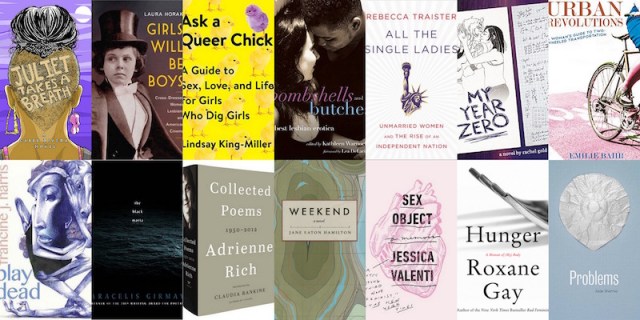
Juliet Takes a Breath, by Gabby Rivera: Juliet Milagros Palante is leaving the Bronx and the mother who, since Juliet came out, might never speak to her again for an internship with a queer feminist author in Portland, Oregon. This debut YA novel from Autostraddle editor Gabby Rivera tells what happens when coming out doesn’t go well — and when running away from your problems looks a lot like solving them. In anticipation, check out Gabby’s writing in our archives. (January 29)
Girls Will Be Boys: Cross-Dressed Women, Lesbians, and American Cinema, 1908-1934, by Laura Horak: Drawing on the early archives of American cinema, Horak questions the assumption that cross-dressing actresses were inherently transgressive. She also argues that cinema played a pivotal role in the representation of lesbian identity, and provides a new lens through which to view gender, sexuality and film. (January 29)
Ask a Queer Chick: A Guide to Sex, Love, and Life for Girls Who Dig Girls, by Lindsay King-Miller: This advice book by long-running Hairpin advice columnist King-Miller covers the range between coming out, your first gay haircut, your first gay wedding and more. (February 2)
Bombshells and Butches: Best Lesbian Erotica, edited by Kathleen Warnock: The latest erotica collection from long-time erotica editor Warnock features all sorts of sex among all sorts of women and people, in places from bars to kitchens to beds to flowerbeds, as well as an introduction by Orange Is the New Black‘s Lea DeLaria. (February 5)
All the Single Ladies: Unmarried Women and the Rise of an Independent Nation, by Rebecca Traister: “[H]istorically, when women were given options beyond early heterosexual marriage, the results were massive social change — temperance, abolition, secondary education, and more.” Traister explores the role of unmarried women across class, race and sexual orientation in radical change in America in this exhaustively researched volume. (March 1)
My Year Zero, by Rachel Gold: Lauren thinks that getting a girlfriend and getting better at school will fix her life, but things get complicated when she meets Sierra and Blake. Gold addresses dealing with mental illness and being out at 16 with her signature empathy and finesse. (March 29)
Urban Revolutions: A Woman’s Guide to Two-Wheeled Transportation, by Emilie Bahr: Cyclist and transportation planner Bahr writes about bike-friendly cities, what makes bicycling a women’s issue, how environments shape opportunities and more in this practical discussion of urban bicycling. (April 12)
play dead, by Francine J. Harris: Harris chronicles sex, rape, addiction, suicide, Detroit and the “too-little-discussed trials and dangers women face” in this raw poetry collection. (April 12)
The Black Maria, by Aracelis Girmay: In her latest collection, 2015 Whiting Award for Poetry winner Girmay examines the African diaspora, racism within American culture and human identity. (April 12)
Collected Poems: 1950-2012, by Adrienne Rich: Rich is one of the most prolific and influential poets of our time, queer or otherwise, and is notable for her examinations of gender, race and class through poetry. This volume, featuring an introduction by Claudia Rankine, brings together every single poem in her oeuvre, including Diving Into the Wreck and Atlas of the Difficult World. (April 16)
Weekend, by Jane Eaton Hamilton: Two lesbian couples living side-by-side for the summer investigate the crossroads of their relationships, as well as trust, negotiation, what isn’t worth keeping and what is. (May 10)
Sex Object: A Memoir, by Jessica Valenti: “[It]t’s a memoir about growing up in a culture that values women based on whether or not they’re sexy, but hates them for having sex. And, more broadly, my experience of trying to find my humanity and sanity in a culture that doesn’t really see women as full people,” says notable feminist Valenti of her forthcoming memoir at the Cut. (June 7)
I’m Just a Person, by Tig Notaro: A new memoir from notable and hilarious comedian Notaro examines the year she got C. diff, her mother died, she had a breakup and was diagnosed with bilateral breast cancer. Combining silliness and vulnerability, she brings readers along into the dark and out of it. (June 14)
Hunger: A Memoir of (My) Body, by Roxane Gay: An anticipated memoir from the author of Bad Feminist and An Untamed State, in Hunger Gay is “trying to balance liking myself and hating my body and wanting to feel comfortable in my body and believing that we need to, as a culture, do some serious work in changing our expectations for human bodies” and more. (June 14)
Problems, by Jade Sharma: Sharma’s debut novel is also the first book in Emily Books’s imprint with Coffee House Press. Following Maya as her life falls apart, it “takes every tired trope about addiction and recovery, ‘likeable’ characters, and redemption narratives, and blows them to pieces.” (July 5)
* This list is dude-free but please talk to me about Lin-Manuel Miranda’s Hamilton: The Revolution, coming in April, anyway.
What queer/ feminist books are you excited about this winter/spring? Tell us in the comments!
